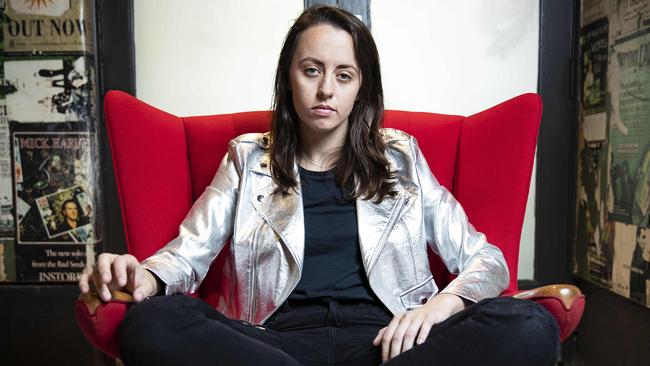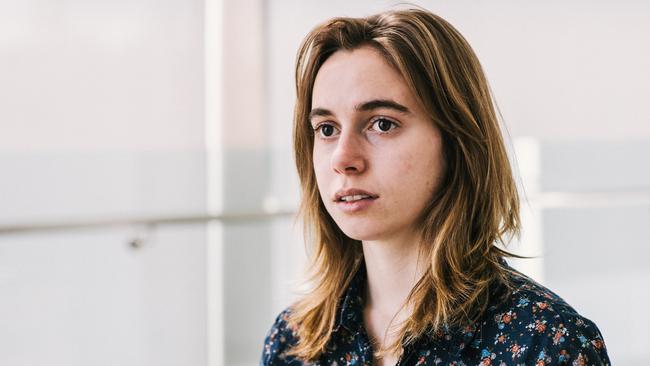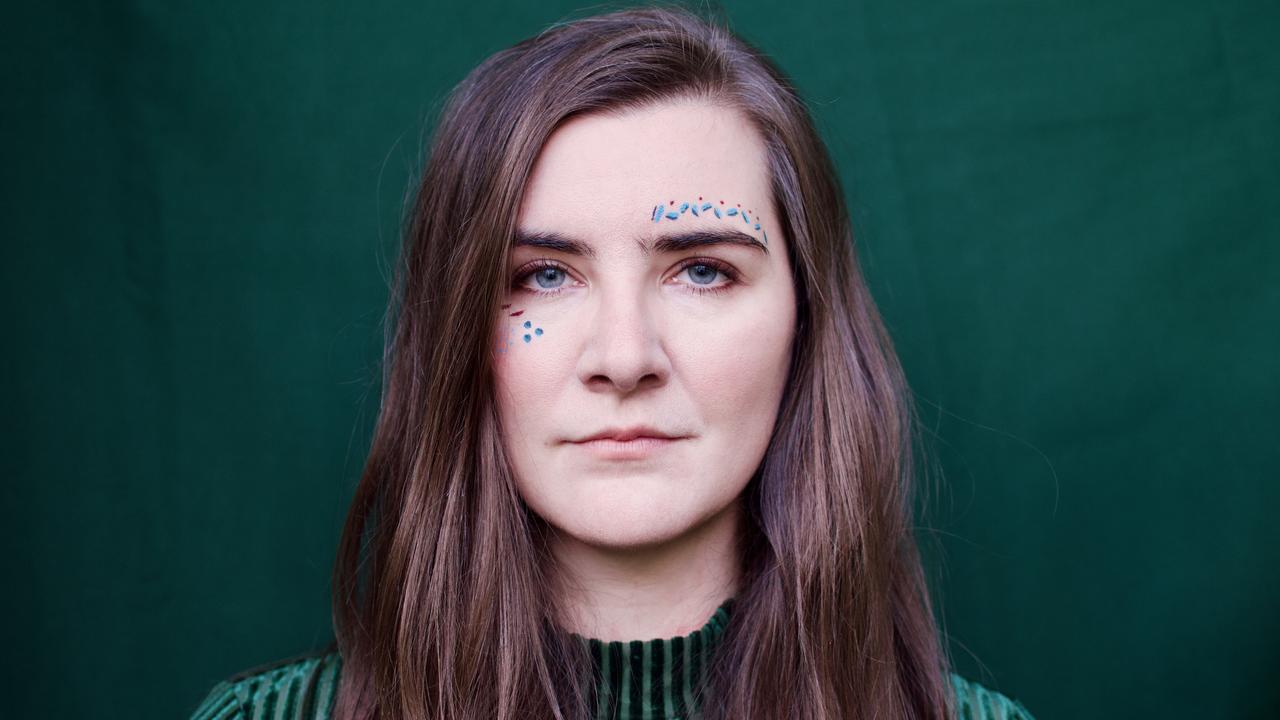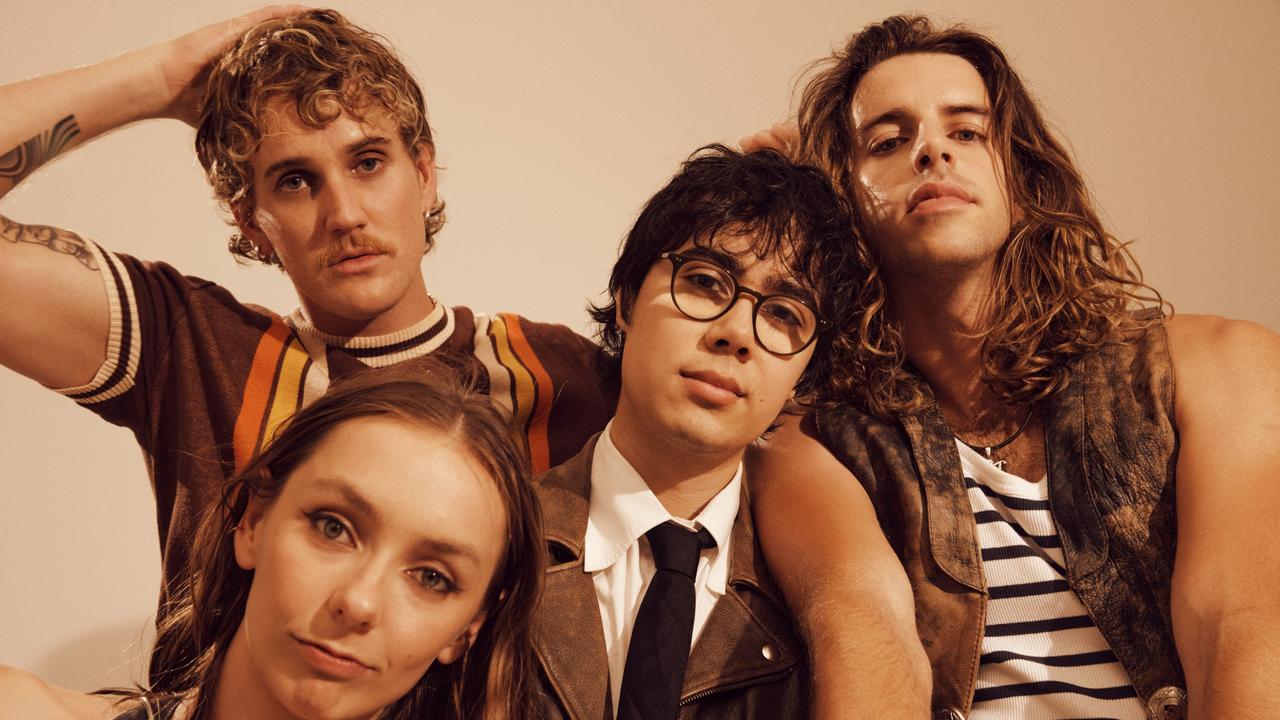Julien Baker and Gordi: from Madrid to Canowindra
American singer-songwriter Julien Baker and Australian artist Gordi discuss their intercontinental friendship.

Julien Baker
I met Sophie in Madrid near the end of 2017, when we combined our shows at the end of a long European tour. I was familiar with the music she made under the moniker of Gordi. [2016 single] Can We Work It Out was the first song of hers that I heard. I listened to it over and over while on a plane.
I love that Sophie’s music is cinematic. It’s not just emotional in that it’s describing an emotional event, or that her voice is effusive and emotive. It’s that she is able to create these very lush soundscapes that really feel like they are taking you through a narrative. There’s so much dynamic in her music, and her voice is so unique and wholly beautiful. In Madrid she was so nice and put on an incredible, breathtaking show. We had a little bit of a chat then, but I think we got to be good friends at an experimental style festival in Wisconsin named Eaux Claires that’s put on by Justin Vernon [of indie folk band Bon Iver]. Everyone shows up about a week early and you spend all the extra time collaborating with other musicians to make something unique — half-improvised, half-planned. On the email chain, Sophie and I asked to work with each other, and we spent a lot of time hanging out at that festival. I played in her set, she played in mine, and we talked a lot about music, and our backgrounds. She’s a dear, dear friend.
I take Sophie to be someone who is very driven and passionate about music and creating. She has this unreal ability to home in on a task and use myriad skills to accomplish amazing creative work. On the producing aspect, Sophie is quite good at using technology — better than I am. She constructs these enormous loops out of nothing in minutes. It’s amazing to watch.

At Eaux Claires, I think we found a lot of solace with each other in that we are more type-A people, who want a plan; we want to produce a finished product that is polished and is the best it can be. I think the structure at the festival was really challenging for us; it felt out of our comfort zone. After we were able to get over that initial apprehension of having just met and creating something together, I think it flowed pretty naturally.
We were in a practice space, Sophie and I both set up all our equipment, and she showed me how she operated all these loops. She ran a harmonium through a looper, and made all these stacked vocal harmony loops. It was quite educating for me, and also pushed me to expand my live set. I don’t exactly understand [musical software program] Ableton but I did an approximation of triggering things and doing more complicated loops because I saw what Sophie was able to accomplish.
With most of my music, I loop everything; I create live loops on the spot. Now I still do that, but in a very different way, so that there’s more range and more dynamics happening in the whole frequency spectrum. I used to stack guitar loops on a single, infinite repeating loop. But after I saw Sophie’s set, and everything going on in her set-up, I tried to make a bit more of a complex situation happen with my looping device. Now it’s just a mad scientist-looking tangle of wires.
I honestly thought Sophie would be too big to share a bill, but I asked my manager: “When we get to Australia, can we please ask if we can play with Sophie again?” I feel like the way you get to see your friends sometimes as a musician — sadly — is playing shows together in the same town, and being deliberate about that. I also want to play shows with an artist who I think has a cool platform and meaningful things to say. It’s important to think about, if I had my pick, who would I want my audience to see? If the audience is this captive group of people who are receiving the art that you put in front of them, you want to put an artist whose voice you really admire in front of them. In this situation, it’s not like I’m doing Sophie any favours, but that’s a person whose art I admire that I want to share a stage with, because we have similar goals and ideals about what we’d like to accomplish about our art.
I find that touring with people you trust and get along with and understand, and who have good communication skills, is invaluable. It’s a profession that’s very high-stress, but high-reward. All of the things I hoped and dreamed of as a child, practising guitar alone in my room — thinking maybe one day I’ll be a musician — [have materialised]. Now that I am a musician, I’m eternally grateful. But it entails a lot of strange hours, stretching mental capacity for change, and uncertainty.
When you’re in a different place every day — sometimes in very far-flung, foreign and unfamiliar places — it’s really nice to be able to have people around you who you can relate to.
The first time I ever went to Australia, we played a lot of smaller towns and festivals, and also played in some far-flung places because I was down there for a month or so. I really like playing in smaller cities, and this time the tour will start in Sophie’s home town — she’s from Canowindra [NSW], but lives in Sydney. I’m really excited to tour with someone who can make recommendations.
I’m going to hand control over to Sophie, and just say: ‘Tell me where I should go. I trust you implicitly.’
Gordi (aka Sophie Payten)
I was stoked to get the support for that show in Madrid because I’d been a long-time fan (of Baker’s). The first song of hers I heard was Sprained Ankle, the breakout song from her first record [in 2015]. It came on Triple J when I was driving to Sydney — I turned it up, Shazamed it, then read a lot about her when I got home. She seemed like such an intelligent person, with well-thought-out opinions — the kind of person I’d like to know.
Julien’s songwriting is really honest and powerful, but delivered in such a way that it’s simple and complex, all at the same time. Her music is undoubtedly heart-wrenching, but she doesn’t hide behind anything. In her songwriting, she paints these beautiful images and has a really good balance of figurative and literal language, which I’ve taken inspiration from.
I was playing my keyboard while sound-checking at the venue in Madrid, and she walked in and was like: ‘Dude, that sounds beautiful!’ She was the sweetest, most enthusiastic person I’ve ever met. When I offered for her to borrow my Nord [keyboard], after she hadn’t brought hers, she acted like I said I’d give her my kidney. We had really lovely chats in the green room afterwards, and watched each other’s sets. We both approach playing live in a similar way: we treat it in a sacred way, and we’re both trying to evoke similar responses from the audience, particularly in solo settings. We both use loops — her more than me — to build these multi-layered songs.
Eaux Claires was honestly one of the most insane and intense experiences of my life. It’s kind of like a school camp. Julien and I were two of the first artists to get there. We caught up that night and decided we should get together the next day and have a bit of a jam. We got to a rehearsal space, plugged in a whole lot of stuff, then picked a key and went for it. We did that for two or three days, for eight hours a day.
As the festival edged closer, it was still unknown exactly what we would be doing. We knew we’d play individually; when she played a Julien Baker set, I got up and played harmonium. When I played a Gordi set, she played guitar with me.
We were also rostered on for two additional sets. One was at a thing called Music Box Village, at a space that looked like a treehouse — but every element was a musical instrument, with little looping pedals at the bottom of each station.
We rocked up having no idea. We were thinking it’d be a little quiet jam that we’ll just play on the fly — but there were like a thousand people sitting there, waiting for us to perform. I felt like I was going to be sick. I thought: ‘What are these people going to do when we start playing gibberish?’
When I play a live show, I’m usually on in-ears [monitors], run a click [track], and have a band. There’s a bit of smoke and mirrors going on. But this was the rawest musical performance of my life, in front of a huge crowd of people. Julien was like: ‘It’ll be fine — let’s do what we did when jamming.’
I’d call out a chord — ‘C major!’ — and she would loop C major on guitar, then I had this vocal pedal that I did some loops on, and basically built this song from scratch that became this big wash of sound.
We did it for 45 minutes, and it worked out beautifully. Finishing that set was as good as any kind of high — we were so exhilarated from having pulled off that bizarre event in front of so many people. It was one of the most special times of my life.
We spent so much time together that week. We told each other intimate things about our own lives, and found different parallels through relationships we’ve had, and the things we’ve struggled with, and write about. Between the two of us, there’s such a lovely friendship and a safe space to be totally honest in. We also started writing a song together but there was so much shit going on that week; hopefully we’ll find time to revisit that.
On this tour, we want to recreate a bit of the magic we felt at Eaux Claires. That might mean a bit of extra improvisation and coming together, or playing familiar songs in a different way.
So often you get set in your ways on a tour: you play the same set night after night, in exactly the same way, and try to remove as many variables as possible. I think this tour will be about putting variables back in to see what little moments you can create that are one-offs.
The first date of this tour is in my home town; after Julien lands in Sydney from New Zealand, we’ll drive out to my folks’ house. Her tour manager, stage manager, and our whole crew will all be staying at my parents’ place. I can show her the town. It’ll be a super nice catch-up.
Canowindra should be a musical hot spot. It’s a town of 3000 people, and it’s super-artsy. They do have people visit; Deborah Conway played a show there not too long ago, and Darren Hanlon.
I’ve also been the beneficiary of a lot of support from the regional arts group, so I’ve been wanting to do a show there for a while, almost as a bit of a “thank you”. I thought pulling an international star like Julien along with me would be a massive bonus, and she was only too happy to oblige.
Playing music can be so incredibly isolating sometimes. For Julien and I, who both tour often as solo artists, you can walk off stage and you’re like, ‘Oh well, that was it, and I’ll share it with myself’, because there’s no one else to bounce that energy off, and nobody to share that experience with in a way that matters.
So I think to share the highs and the lows with a friend is a real privilege. I feel so lucky to be able to do it because it just doesn’t happen all that often.
Julien Baker and Gordi will perform in Canowindra on February 17, followed by Sydney (Feb 19), Brisbane (Feb 23), Byron Bay (Feb 24) and Melbourne (Feb 26). Baker will also perform at the Perth International Arts Festival (Feb 21).




To join the conversation, please log in. Don't have an account? Register
Join the conversation, you are commenting as Logout